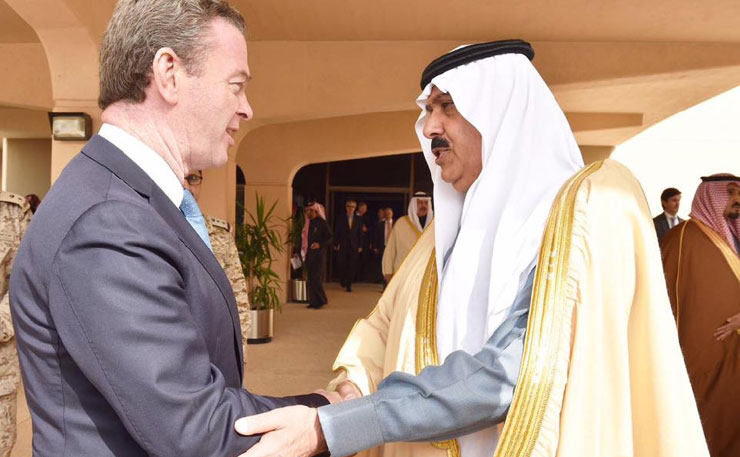Australia has turned a blind eye to the Saudi-led warn on Yemen, while the nation plunges deeper into a humanitarian crisis. But at least we’re trying to profit from it. Michael Brull reports.
On 30 October, Minister for Defence Industry Christopher Pyne announced he’d be visiting Saudi Arabia, France and the United Kingdom “to promote Australia’s world-class defence materiel and strengthen bilateral defence industry relationships.” In Saudi Arabia he would “meet with senior government representatives to discuss the bilateral defence industry relationship.”
Presumably, this was in the hope of further expanding Australian military exports to Saudi Arabia.
Saudi Arabia needs military imports in particular right now because of its devastating war on Yemen. The government ignored a motion passed in the Senate calling on it to disclose its military exports to Saudi Arabia since 2016. We know that Australia has approved four military exports to the Saudi government, but not the nature or value of that exports.
In a speech in July, Pyne discussed his plans to expand Australian military exports. In relation to Yemen, Pyne said, “The Australian designed Nulka decoy system that protects ships from missiles not so long ago saved the USS Mason from an attack by Houthi rebels off the coast of Yemen.”
There may be other military exports to the Saudi invading force. For example, Pyne also talked about Australian company Marand making tail pieces and specialised engine trailers for Joint Strike Fighters. Their order book will be for over $1 billion, “not just for Australia’s Joint Strike Fighters – that’s exporting vital components made here in Australia overseas, to take their place on perhaps the most advanced combat aircraft the world has ever seen, that will be operated by the USA, the United Kingdom, Japan, Israel and many other countries.”
On November 8, the United Nations Under-Secretary-General for Humanitarian Affairs and Emergency Relief Coordinator Mark Lowcock gave a speech about Yemen. In response to a missile fired at Saudi Arabia from Yemen, “a number of measures” were introduced by the invading coalition of countries, led by Saudi Arabia. These have “effectively clos[ed]air, sea and land access to Yemen.”
Lowcock continued:
I have told the Council that unless those measures are lifted and five particular steps that I am going to run through are taken, there will be famine in Yemen.
It will not be like the famine that we saw in South Sudan earlier in the year where tens of thousands of people were affected. It will not be like the famine which cost 250,000 people their lives in Somalia in 2011. It will be the largest famine the world has seen for many decades, with millions of victims.
Let me underline that. Unless the tightened blockade on Yemen is lifted, there will be famine in Yemen. It will be the largest famine in many decades, with millions of victims.
Christopher Pyne went to Saudi Arabia less than two weeks earlier as part of his tour of promoting our “world class defence materiel”, and strengthening bilateral defence industry relationships. That is, he went to Saudi Arabia to promote more Australian military exports.
23 Humanitarian organisations such as CARE, Oxfam, Save the Children and the UN put out a joint statement on the Saudi led coalition decision to enforce the “closure of all Yemeni airports, seaports and land crossings which is preventing critical humanitarian aid deliveries and commercial supplies from reaching the country and the movement of aid workers in and out of Yemen. The humanitarian situation in Yemen is extremely fragile and any disruption in the pipeline of critical supplies such as food, fuel and medicines has the potential to bring millions of people closer to starvation and death.”
It continues:
“There are over 20 million people in need of humanitarian assistance; seven million of them, are facing famine-like conditions and rely completely on food aid to survive. In six weeks, the food supplies to feed them will be exhausted. Over 2.2 million children are malnourished, of those, 385,000 children suffer from severe malnutrition and require therapeutic treatment to stay alive. Due to limited funding, humanitarian agencies are only able to target one third of the population (7 million) and some two thirds of the population rely on the commercial supplies which are imported, therefore, the continued availability of commodities in the markets is essential to prevent a deterioration of food insecurity. Any food shortage will result in a further increase of food prices beyond the purchasing power of the average Yemeni.”
They also underlined the catastrophic implications of the blockade on medical supplies:
“The current stock of vaccines in country will only last one month. If it is not replenished, outbreaks of communicable diseases such as polio and measles are to be expected with fatal consequences, particularly for children under five years of age and those already suffering from malnutrition. The people of Yemen are already living with the catastrophic consequences of an armed conflict – lasting for over two and a half years – that has destroyed much of its vital infrastructure and brought the provision of basic services to the brink of collapse. Any further shocks to imports of food and fuel may reverse recent success in mitigating the threat of famine and the spread of cholera. “
The UN has already warned of the “the fastest-growing cholera epidemic ever recorded, with some 895,000 suspected cases as of 1 November”. There have been 2,200 deaths in Yemen from cholera since April. The “outbreak is affecting over 90 per cent of districts across 21 of the country’s 22 governorates.”
21 million people in Yemen need “urgent humanitarian assistance, seven million of whom are severely food insecure, staving off the threat of famine.” There are some 28 million people in Yemen.
The war on Yemen is extremely brutal. Australia is complicit in the murder of millions of people, due to the Saudi coalition’s consciously chosen war strategy. The Saudi coalition depends entirely on the diplomatic and military support of Western allies, such as Australia. The Saudi coalition can maintain its current closure of Yemen’s border only with Western support.
Let me go back to Lowcock’s words. Unless the closure of Yemen’s airports, seaports and land closings are lifted, there will be famine in Yemen. It will be the largest famine the world has seen for many decades.
And the Australian Minister for Defence Industry just visited to talk about strengthening our bilateral defence industry relationship.
Donate To New Matilda
New Matilda is a small, independent media outlet. We survive through reader contributions, and never losing a lawsuit. If you got something from this article, giving something back helps us to continue speaking truth to power. Every little bit counts.







